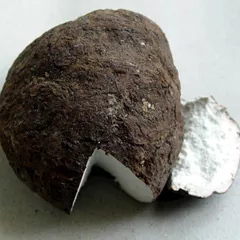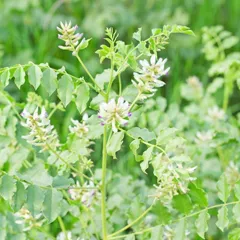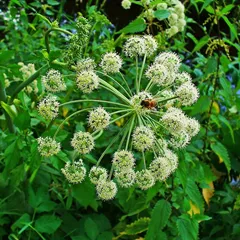Jia Wei Xiao Yao San
Chinese: 加味逍遥散
Pinyin: Jiā Wèi Xiāo Yáo Sàn
Other names: Bupleurum and Peony Combination, Augmented Rambling Powder








Jia Wei Xiao Yao San
Chinese: 加味逍遥散
Pinyin: Jiā Wèi Xiāo Yáo Sàn
Other names: Bupleurum and Peony Combination, Augmented Rambling Powder
Ingredients: 10 herbs
Category: Formulas that harmonize Liver-Spleen
Mother formula: Xiao Yao San
- Clears Liver and Spleen Qi Stagnation
- Tonifies Spleen
- Clears Deficient Heat
- Nourishes the blood
Source: Summary of Internal Medicine (Ming dynasty)
The information provided here is not a replacement for a doctor. You shouldn't use it for the purpose of self-diagnosing or self-medicating but rather so you can have a more informed discussion with a professional TCM practitioner.
Jia Wei Xiao Yao San is a 10-ingredient Chinese Medicine formula with Bupleurum Roots (Chai Hu) as a principal ingredient.
Invented in Ming dynasty, it belongs to the category of formulas that harmonize Liver-Spleen. Its main actions are: 1) clears Liver and Spleen Qi Stagnation and 2) tonifies Spleen.
In Chinese Medicine health conditions are thought to arise due to "disharmonies" in the body as a system. These disharmonies are called "patterns" and the very purpose of herbal formulas is to fight them in order to restore the body's harmony.
In this case Jia Wei Xiao Yao San is used by TCM practitioners to fight patterns like Stagnant Liver Qi turning into Fire, Qi And Blood Stagnation or Liver Qi Stagnation. From a Western Medicine standpoint, such patterns can give rise to a range of conditions such as menstrual cramps, absence of menstruation or early menstruation for instance.
On this page, after a detailed description of each of the ten ingredients in Jia Wei Xiao Yao San, we review the patterns and conditions that Jia Wei Xiao Yao San helps treat.
The ten ingredients in Jia Wei Xiao Yao San

Chai Hu is a king ingredient in Jia Wei Xiao Yao San. Like the name indicates, it means it has more power than other ingredients in the formula.
1. Bupleurum Roots (Chai Hu)
Chai Hu spreads the Liver Qi, relieves stagnation and helps guide the other herbs into the Liver. Because of its cooling nature, it is also particularly dealing with Qi Stagnation that has started to generate Heat.

Bai Shao is a deputy ingredient in Jia Wei Xiao Yao San. This means it helps the king ingredient(s) treat the main pattern or it serves to treat a coexisting pattern.
2. White Peony Roots (Bai Shao)
Part used: Dried root
Nature: Neutral
Meridian affinity: LiverSpleen
Category: Tonic herbs for Blood Deficiency
In general Bai Shao's main actions are as follows: "Tonifies the Blood and preserves the Yin. Nourishes the Liver and assists in the smooth flow of Qi. Regulates the meridians and eases the pain."
In the context of Jia Wei Xiao Yao San, it is used because it moves Qi and is specific for menstrual problems, especially from emotional stress.

Fu Ling is an assistant ingredient in Jia Wei Xiao Yao San. This means that it either serves to reinforces the effect of other ingredients or it moderates their toxicity.
3. Poria-Cocos Mushrooms (Fu Ling)
Part used: Dried sclerotium
Nature: Neutral
Taste(s): Sweet
Meridian affinity: HeartKidneyLungSpleen
Category: Herbs that drain Dampness
In general Fu Ling's main actions are as follows: "Encourages urination and drains Dampness. Tonic to the Spleen/Stomach. Assists the Heart and calms the Spirit."
In the context of Jia Wei Xiao Yao San, it is used because it strengthens the Spleen.

Gan Cao is an assistant ingredient in Jia Wei Xiao Yao San. This means that it either serves to reinforces the effect of other ingredients or it moderates their toxicity.
4. Liquorice (Gan Cao)
Part used: Dried root and rhizome
Nature: Neutral
Taste(s): Sweet
Meridian affinity: HeartLungSpleenStomach
Category: Tonic herbs for Qi Deficiency
Gan Cao tonifies the Spleen and, when combined with White peony roots (as is the case here), helps reduce the spasms that are often a symptoms for patients that use this formula.

5. Dong Quai (Dang Gui)
Part used: Dried root
Nature: Warm
Meridian affinity: HeartLiverSpleen
Category: Tonic herbs for Blood Deficiency
Dang Gui works together with White peony roots, the other deputy in this formula, to nourish Blood. This nourishing role also in turn helps strengthen the Liver since it stores Blood and is nourished by it.

6. Atractylodes Rhizomes (Bai Zhu)
Part used: Dried rhizome
Nature: Warm
Meridian affinity: SpleenStomach
Category: Tonic herbs for Qi Deficiency
Bai Zhu works together with Poria mushrooms (Fu Ling) to strengthen the Spleen. Indeed, as described in the famous TCM treaty Essentials from the Golden Cabinet: "When one sees a Liver disorder, one knows that the Liver will transmit it to the Spleen. Therefore, one should first treat the Spleen." Strengthening the Spleen, since it "rules transformation and transportation", has a direct positive impact on Blood-Deficiency.

7. Mudan Peony Bark (Mu Dan Pi)
Part used: Root barks
Nature: Cool
Meridian affinity: HeartKidneyLiver
Category: Herbs that cool the Blood
In general Mu Dan Pi's main actions are as follows: "Cools the Blood, activates Blood circulation and resolves Blood stasis."

8. Cape Jasmine Fruits (Zhi Zi)
Part used: Dried ripe fruit
Nature: Cold
Taste(s): Bitter
Meridian affinity: GallbladderHeartLungSanjiao
Category: Herbs that clear Heat and purge Fire and/or clear Summer Heat
In general Zhi Zi's main actions are as follows: "Clears Heat and calms spirit. Drains Damp-Heat affecting the Liver and Gallbladder. Clears Heat in the Blood and stops bleeding. Anti-inflammatory."

10. Fresh Ginger (Sheng Jiang)
In general Sheng Jiang's main actions are as follows: "Relieves the Exterior and disperses Cold. Warms and circulates Qi in the Middle Burner. Calms a restless fetus and treats morning sickness. Treats seafood poisoning."
Conditions and patterns for which Jia Wei Xiao Yao San may be prescribed
It's important to remember that herbal formulas are meant to treat patterns, not "diseases" as understood in Western Medicine. According to Chinese Medicine patterns, which are disruptions to the body as a system, are the underlying root cause for diseases and conditions.
As such Jia Wei Xiao Yao San is used by TCM practitioners to treat five different patterns which we describe below.
But before we delve into these patterns here is an overview of the Western conditions they're commonly associated with:
Menstrual cramps Absence of menstruation Early menstruation Infertility Menorrhagia Menopausal syndrome Painful menstruation
Again it wouldn't be correct to say "Jia Wei Xiao Yao San treats menstrual cramps" for instance. Rather, Jia Wei Xiao Yao San is used to treat patterns that are sometimes the root cause behind menstrual cramps.
Now let's look at the five patterns commonly treated with Jia Wei Xiao Yao San.

The Liver is a so-called "Zang" Organ. Learn more about the Liver in Chinese Medicine
Stagnant Liver Qi turning into Fire
Pulse type(s): Wiry (Xian)
Tongue color: Red points on the sides
Symptoms: Anger Thirst Red face Red eyes Red lips Insomnia Moodiness Dizziness Headaches Melancholy Depression Dry stools Dense milk Irritability Constipation Heavy periods Abdominal pain Feeling of heat Menstrual cramps Breast distention Outbursts of anger Sore and weak limbs Premenstrual tension Dark menstrual blood Epigastric distension Scanty and dark urine Irregular menstruation Hypochondrial distention Bitter taste in the mouth Feeling of lump in the throat Premenstrual breast distension Feeling of oppression of the chest Distention and pain in the chest and hypochondria
Jia Wei Xiao Yao San is sometimes prescribed by TCM practitioners to treat Stagnant Liver Qi turning into Fire. This pattern leads to symptoms such as hypochondrial distention, epigastric distension, feeling of oppression of the chest and irritability. Patients with Stagnant Liver Qi turning into Fire typically exhibit wiry (Xian) pulses as well as Red on the sides .
This pattern develops from Liver Qi Stagnation, which creates excessive amount of Heat and then turn into Liver Heat. It manifests with a feeling of heat, a red face and desire to drink.
From a mental emotional perspective, patients tend to be irritable, anxious, moody and prone to outbursts of... read more about Stagnant Liver Qi turning into Fire

Qi is one of Chinese Medicine's vital subtances. Learn more about Qi in Chinese Medicine
Qi And Blood Stagnation
Pulse type(s): Choppy (Se), Deep (Chen), Fine (Xi)
Symptoms: Melasma Insomnia Dark face Moodiness Dizziness Chest pain Depression Amenorrhea Purple lips Mood swings Breast pain Hot flushes Purple nails Irritability Blotchy skin Restlessness Breast lumps Restlnessness Chest fullness Painful period Scanty periods Clots in blood Abdominal pain Abdominal masses Lochia retention Breast distention Dark colored blood Abdominal fullness Intense period pain High blood pressure Swelling of the feet Lower abdominal pain Dark menstrual blood Flooding and leaking Abdominal distension Pre-menstrual tension Black and tarry stools Irregular menstruation Boring fixed stabbing pain Pre-menstrual irritability Dark clots in menstrual blood Menstruation decreases gratually Feeling of fullness in the chest Abdominal distention and fullness Pain relief after clots discharge
Jia Wei Xiao Yao San is sometimes prescribed by TCM practitioners to treat Qi And Blood Stagnation. This pattern leads to symptoms such as chest fullness, chest pain, boring fixed stabbing pain and dark face. Patients with Qi And Blood Stagnation typically exhibit choppy (Se), deep (Chen) or fine (Xi) pulses.
The typical symptoms of Qi stagnation are distension, oppression and swelling. There are also emotional issues like mood swing, depression or irritability. However, the Blood Stagnation is more on pains and purple color manifestation on skin, face, lips and nails.
Qi Stagnation can cause the... read more about Qi And Blood Stagnation

The Liver is a so-called "Zang" Organ. Learn more about the Liver in Chinese Medicine
Liver Qi Stagnation
Pulse type(s): Wiry (Xian)
Tongue color: Normal (light red)
Symptoms: Anger Fever Nausea Sighing Anxiety Melasma Blister Vomiting Diarrhea Belching Moodiness Hiccuping Headaches Dark face Melancholy Depression Borborygmi Neck lumps Flank pain Mood swings Fluctuation Breast pain Irritability Breast lumps Constipation Poor appetite Breast eczema Abdominal pain Epigastic pain Breast redness Breast nodules Scanty periods Clots in blood Breast hardness Chest distension Menstrual cramps Frequent sighing Breast distention Dark nipple color Thick breast milk Abdomen distension Hypochondriac pain Clogged milk ducts Breast skin cracks Uneven milk supply Dark colored blood Suppressed emotions Premenstrual tension Breast pus discharge Breast skin ichiness Abdominal distension Lower abdominal pain Feeling of distension Epigastric distension Pre-menstrual tension Epigastrium distension Irregular menstruation White spots on nipples Feelings of frustration HypochondriaI distension Yellow vaginal discharge Sticky vaginal discharge Alternating fever and chills Feeling of lump in the throat Premenstrual breast distension Churning feeling in the stomach Abdominal distention and fullness Feeling of pulsation in epigastrium Alternating constipation and diarrhea Insufficient or absent lactation after childbirth Stifling sensation in the chest causing one to have deep sighs
Jia Wei Xiao Yao San is sometimes prescribed by TCM practitioners to treat Liver Qi Stagnation. This pattern leads to symptoms such as hypochondriai distension, chest distension, epigastrium distension and abdomen distension. Patients with Liver Qi Stagnation typically exhibit wiry (Xian) pulses as well as Normal or slightly red on the sides.
When Liver Qi does not flow smoothly or regularly, it becomes Stagnant and in Excess. This leads to Heat accumulating in the Liver. This affects not only the Liver, but other connected Organs as well as the Seven Emotions.
Liver Qi Stagnation is not only the most seen Liver disharmony, but also one... read more about Liver Qi Stagnation

Blood (Xue) is one of Chinese Medicine's vital subtances. Learn more about Blood in Chinese Medicine
Heat in the Blood
Pulse type(s): Rapid (Shu)
Tongue color: Red
Symptoms: Fever Thirst Eczema Anxiety Itching Insomnia Delirium Red face Tinnitus Dry mouth Dizziness Dark Urine Dry stools Dry throat Bloody nose Malar flush Bloody urine Irritability Restlessness Night sweats Constipation Bloody sputum Bloody stools Heavy periods Restlnessness Early periods Cough of blood Abdominal pain Scanty periods Feeling of heat Delirious speech Vomiting of blood Red skin eruptions Dark colored blood Pale color periods Thick menstrual blood Black and tarry stools Thin and watery periods Bitter taste in the mouth Frequent bleeding episodes Trickling blood after period Dark clots in menstrual blood Pre-menstrual breast distention Abdominal distention and fullness Flooding suddenly before schedule Thirst with an inability to swallow Frequent bleeding episodes in stools urine or vomit
Jia Wei Xiao Yao San is sometimes prescribed by TCM practitioners to treat Heat in the Blood. This pattern leads to symptoms such as feeling of heat, red skin eruptions, thirst and frequent bleeding episodes. Patients with Heat in the Blood typically exhibit rapid (Shu) pulses as well as Red tongue.
The most common cause of Heat in the Blood is a Heat Pernicious Influence that has invaded the body and agitates the Blood. This results in accelerated blood flow which manifests itself in a rapid pulse, expanded and damaged Blood vessels and often heavy bleeding. The Blood will be fresh red or... read more about Heat in the Blood

The Liver is a so-called "Zang" Organ. Learn more about the Liver in Chinese Medicine
Liver Qi Stagnation with Spleen Qi Deficiency that transforms into Heat
Symptoms: Red eyes Dry mouth Tidal fever Irritability Palpitations Heavy periods Painful urination Spontaneous sweating Lower abdominal pressure Abnormal uterine bleeding
Jia Wei Xiao Yao San is sometimes prescribed by TCM practitioners to treat Liver Qi Stagnation with Spleen Qi Deficiency that transforms into Heat. This pattern leads to symptoms such as irritability, spontaneous sweating, red eyes and dry mouth.
Learn more about Liver Qi Stagnation with Spleen Qi Deficiency that transforms into Heat
Formulas similar to Jia Wei Xiao Yao San
Dan Zhi Xiao Yao San is 80% similar to Jia Wei Xiao Yao San
Xiao Yao San is 60% similar to Jia Wei Xiao Yao San
Xuan Yu Tong Jing Tang is 60% similar to Jia Wei Xiao Yao San
Ba Zhen Tang is 60% similar to Jia Wei Xiao Yao San
Bu Zhong Yi Qi Tang is 50% similar to Jia Wei Xiao Yao San
Ba Zhen Yi Mu Tang is 50% similar to Jia Wei Xiao Yao San












